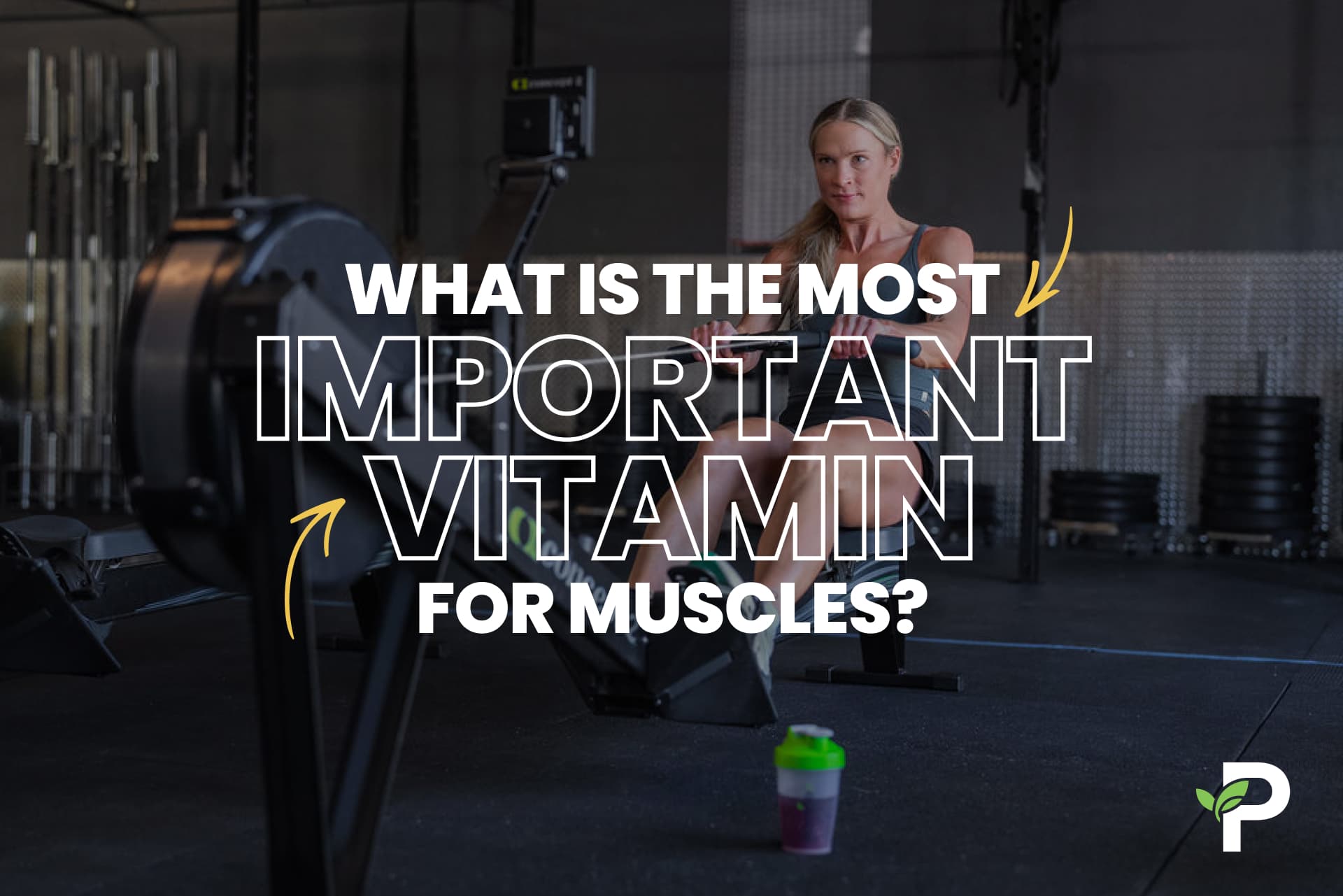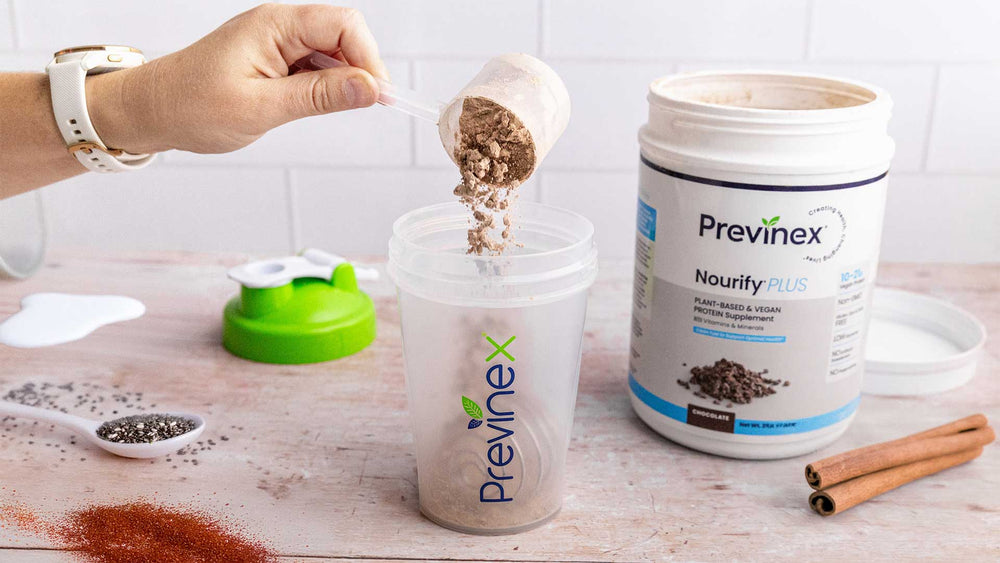Strong muscles need more than protein. The right vitamins and nutrients help your body build strength, recover effectively, and stay strong over time.
Whether you’re training regularly or simply want to maintain muscle as you age, understanding which vitamins matter most can help you make smarter choices about food, muscle health supplements, lifestyle, and recovery.
What is the Most Important Vitamin for Muscles?
Vitamin D stands out as one of the most important nutrients for healthy muscles. Beyond its well-known role in maintaining strong bones and supporting calcium balance, vitamin D is also directly involved in muscle function and performance.
Research shows that vitamin D and its receptor influence muscle development, strength, and recovery. It also promotes skeletal muscle regeneration, helping restore mitochondrial function and activate satellite cells that repair muscular fibers after exercise or injury.
That said, muscle health depends on more than just vitamin D:
-
B Vitamins help convert food into usable energy and support protein metabolism
-
Vitamin C contributes antioxidant and anti-inflammatory protection, helping muscles recover from oxidative stress after training
-
Vitamin E plays a similar role by defending muscle cells from free radical damage
-
Nutrients like calcium, creatine monohydrate, essential amino acids (EAAs), and branched-chain amino acids (BCAAs) are also crucial for maintaining strength, endurance, and efficient recovery
How Do Vitamins Support Muscle Health?
Vitamins help fuel nearly every process your muscles depend on, including energy production, repair, growth, and long-term performance. When your body has the right balance of nutrients, muscles are better equipped to recover from training stress and stay strong over time.
Vitamin D
Vitamin D helps regulate calcium absorption and muscle contraction, two essential functions for maintaining strength and coordination. Its receptors are found throughout the body and influence the expression of thousands of genes involved in cellular repair and metabolism. Vitamin D deficiency can contribute to low bone density, muscle weakness, and conditions such as osteomalacia. In all, there are over 2,000 genes in the body that are influenced by vitamin D. Beyond muscles, adequate vitamin D supports overall health and resilience.
B Vitamins
B vitamins help your body convert food into energy and support muscle metabolism. They primarily act as coenzymes, which means they’re involved in protein synthesis and tissue repair, both of which are critical during recovery. In one study, researchers found that participants who took vitamin B-complex for 28 days showed improvements in endurance, reduced fatigue, and better exercise performance, even without prior athletic training.
Vitamin C
While vitamin C is well known for its immune system benefits, it also supports collagen formation, which helps repair muscle tissue and maintain connective structure. Vitamin C is also a powerful antioxidant, neutralizing oxidative stress after workouts and possibly promoting faster wound healing and recovery.
Vitamin E
Vitamin E works alongside vitamin C as an antioxidant, protecting cells from oxidative stress caused by intense exercise. Studies show that low-dose vitamin E supplementation is beneficial for preventing exercise-induced muscle damage. In fact, supplementing with less than 500 IU may even help prevent such damage. By protecting muscle fibers from free radical damage, vitamin E supports long-term strength and recovery.
Where to Get the Vitamins and Nutrients Your Muscles Need
Supporting muscle health means making sure your body gets a steady supply of essential vitamins and nutrients. Here’s where you can find the key players:
Sources of Vitamin D
Food sources include fatty fish like salmon, mackerel, and sardines, as well as egg yolks and fortified foods such as milk or plant-based alternatives. Sun exposure also helps your body produce vitamin D. Supplements can be useful for those who don’t get enough from diet or sunlight.
Sources of B Vitamins
B Vitamins are widely found in whole grains, lean meats, poultry, eggs, dairy, legumes, nuts, and seeds.
Sources of Vitamin C
Citrus fruits like oranges, lemons, and grapefruits, along with strawberries, bell peppers, and broccoli, are excellent sources.
Sources of Vitamin E
Nuts and seeds, spinach, and avocado provide good amounts of vitamin E.
Sources of Calcium
Calcium is found in dairy products, fortified plant-based milks, tofu, and leafy greens like kale and collard greens.
Sources of Creatine Monohydrate
Primarily found in red meat and fish, creatine can also be supplemented to support muscle strength, power, and recovery, especially for those with higher physical demands.
Sources of Essential Amino Acids (EAAs) and Branched-Chain Amino Acids (BCAAs)
Complete proteins—foods that provide all nine essential amino acids—include meat, poultry, seafood, eggs, and dairy. Plant-based options include soy (tofu, tempeh, edamame), quinoa, and buckwheat. BCAAs (leucine, isoleucine, and valine) are particularly important for stimulating muscle protein synthesis. Both EAAs and BCAAs can be taken via high-quality supplements.
Combining a well-balanced diet with targeted supplementation ensures your muscles receive all the nutrients they need for strength, recovery, and long-term health.
What Supplements Contain the Best Vitamins for Muscle Health?
The most effective muscle health supplements combine key vitamins, minerals, and amino acids that work together to support strength, recovery, and performance. Look for formulas that include nutrients such as:
-
Vitamin D, C, E, and B-complex
-
Calcium
These ingredients help your body repair muscle tissue, produce energy efficiently, and reduce oxidative stress after exercise.
Quality matters as much as nutrient content. Choose supplements made with clinically studied ingredients, high bioavailability, and demonstrated effectiveness, so that your body can absorb all the nutrients and start using them right away.
Before adding a new supplement to your routine, talk with a healthcare provider, especially if you take prescription medications. Some nutrients and compounds can interact negatively with other treatments, so it’s crucial to confirm what’s safe and effective for your individual needs.
Building Stronger Muscles with the Right Vitamins
Supporting muscle health goes beyond workouts. It’s about giving your body the nutrients it needs to recover, grow, and perform well at every stage of life. In addition to diet and lifestyle, a supplement that combines high-quality amino acids, vitamins, and minerals can help fill nutritional gaps and keep your muscles functioning at their best.
Muscle Health PLUS is formulated with clinically studied ingredients such as creatine monohydrate, myHMB®, BCAAs, essential amino acids, and AstraGin®, along with vitamin D and calcium. Together, they help reduce muscle breakdown, increase lean muscle mass, boost protein synthesis, and enhance your natural strength and recovery. Whether you’re training regularly or simply aim to stay active and strong, consistent nutrition can make all the difference.




